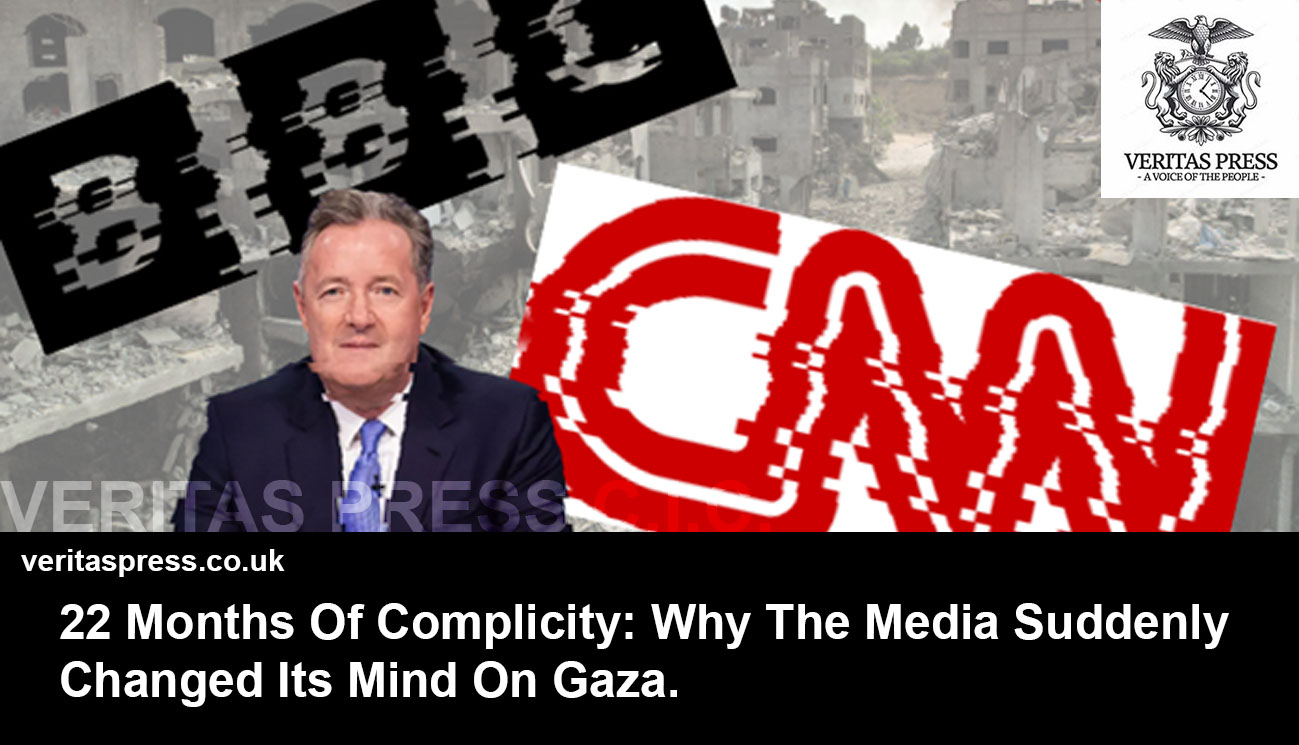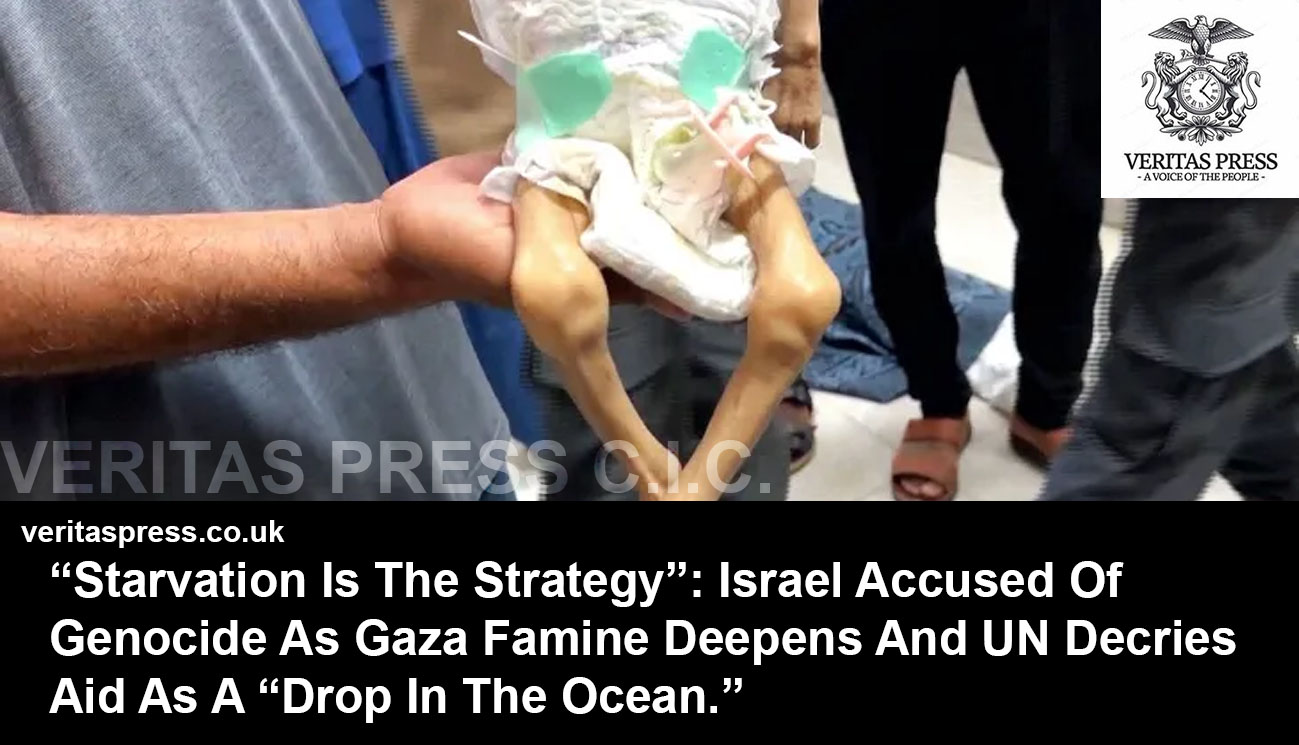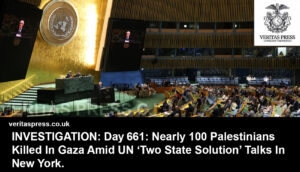For nearly two years, major Western media outlets failed to tell the truth about Gaza. From October 2023 through much of 2025, Western mainstream media (MSM), including the BBC, CNN, The New York Times, Fox News, France 24, Sky News, and Reuters, perpetuated a narrative shaped by Israeli government talking points. That narrative reduced a genocidal war to a “conflict,” erased Palestinian suffering, and sanitised Israeli war crimes under the guise of “self-defence.”
Now, suddenly, as international legal proceedings intensify and global public opinion reaches a tipping point, those same outlets have shifted their tone. Reports of mass starvation, executions, and mass graves, once ignored or downplayed, now dominate headlines. But this shift is neither brave nor accidental. It is reactive, strategic, capitalistic, and in many ways, too late. The media’s feigned awakening is performative, theatrical, aimed not at ending the genocide but at saving face.
From Silence To Selective Outrage: The Media’s 22-Month Complicity:
From the moment Israel launched its full-scale assault on Gaza in October 2023, most Western outlets uncritically parroted Israeli claims. Mass killings of civilians were justified through the unverified mantra of “Hamas human shields.” The decimation of Gaza’s hospitals, schools, and refugee camps was rarely framed as a war crime. The blockade, enforced starvation, and collective punishment of 2.3 million people were simply background noise in a narrative dominated by Israeli military briefings and defence analysts.
Even as respected human rights organisations, including Amnesty International, Human Rights Watch, and B’Tselem, documented what they described as “crimes against humanity,” coverage remained skewed. Palestinian casualties, including thousands of children, were reduced to anonymous numbers, while Israeli casualties were humanised and profiled. Terms like “genocide,” “apartheid,” and “ethnic cleansing” were largely absent from Western media coverage, despite growing scholarly and legal consensus on their applicability.
The media’s omissions were not mere editorial oversights. They were part of a broader architecture of dehumanisation, one that legitimised a campaign of extermination by casting it as an unfortunate consequence of anti-terrorism operations.
The Sudden Pivot: What Changed?
By mid-2025, the tone began to shift.
The shift didn’t come in response to Palestinian suffering, which has long been evident, but to political and reputational pressure. The International Court of Justice (ICJ) ruled in June 2025 that Israel’s actions in Gaza likely constitute genocide. Satellite imagery, leaked UN memos, and forensic reports uncovered mass graves outside hospitals. Starvation deaths surged past 18,000, according to the UN Office for the Coordination of Humanitarian Affairs (OCHA). Eyewitness accounts from aid workers and doctors, including Médecins Sans Frontières and UNRWA staff, painted a picture of calculated, total destruction.
A coordinated statement in July 2025 by Reuters, the Associated Press, AFP, and the BBC expressing concern for “the safety of journalists in Gaza” marked a tipping point. It was a belated recognition of the deadliest conflict for journalists in modern history, yet it failed to mention that nearly all the 217 journalists killed were Palestinians, many working without flak jackets, food, or international protection.
The rhetorical pivot extended to Western politicians. UK Labour leader Keir Starmer, long silent on Israeli atrocities, called for an “immediate ceasefire.” U.S. officials, including previously hawkish Democrats, urged “restraint.” Yet even now, these calls coexist with continued arms transfers, diplomatic protection at the UN Security Council, and domestic repression of Palestine solidarity movements.
Is It Genuine? Absolutely Not:
What’s happening is not a moral awakening; it’s damage control.
Media outlets are attempting to recalibrate after months of failing to do their job. Their newfound concern aligns not with the facts on the ground, but with the changing political landscape: South Africa’s ICJ genocide case against Israel, growing European legal scrutiny, and mass global protests from London to Santiago to Jakarta.
In fact, the conditions prompting this shift have been present all along.
In April 2024, B’Tselem published its groundbreaking report Manufacturing Famine, detailing how Israel’s blockade was designed not only to restrict Hamas but to collectively punish Gaza’s civilian population. The report included Israeli documents outlining calorie calculations to “put Gaza on a diet”, echoing policies long criticised by the UN and humanitarian organisations.
Genocidal rhetoric by top Israeli officials dates back to the earliest days of the war. On October 9, 2023, then-Defence Minister Yoav Gallant infamously described Palestinians as “human animals,” justifying a total siege: “No electricity, no food, no water, no fuel. We are fighting human animals, and we will act accordingly.” Prime Minister Netanyahu repeatedly invoked biblical language suggesting ethnic cleansing, referring to Amalek, whose annihilation is a religious justification for genocide in Zionist discourse.
These quotes were available. They were said publicly. Most media simply chose not to report them, or to strip them of context and consequence.
Performative Solidarity: The Journalist And Aid Worker Narrative.
The supposed solidarity with journalists and aid workers is equally selective.
Palestinian journalists have been hunted and killed in Gaza for nearly two years. They’ve continued broadcasting under bombardment, amid personal loss, starvation, and trauma. Veteran photojournalist Motaz Azaiza was forced to flee Gaza in January 2024 under threats from both Israel and Hamas, after his videos of wounded children and demolished neighbourhoods reached millions. Others, like journalists from Al Jazeera, Shehab, and local news collectives, were killed in their homes alongside family members.
The Committee to Protect Journalists (CPJ) now confirms this is the most dangerous war for journalists in recorded history. Yet it took Western outlets until July 2025 to even acknowledge their deaths.
Humanitarian agencies have also lost dozens of staff members, including seven World Central Kitchen workers targeted in an April 2024 Israeli drone strike. The outrage from media and political figures focused more on the Western nationalities of the victims than on the wider context of Israeli assaults on aid workers, clinics, and distribution centres.
An Information War Built On Misinformation:
The media also played a central role in enabling misinformation. The infamous claim that Hamas had beheaded “forty babies” on October 7, spread by CNN and repeated by President Biden, was never substantiated and has long since been discredited. However, retractions were not broadcast with the same expediency as the initial reports, and this narrative persists despite its proven falsehood.
Similarly, Israel’s denial of responsibility for the October 17, 2023 bombing of Al-Ahli Arab Hospital, which killed over 500 civilians, was accepted at face value by most Western outlets, despite conflicting forensic evidence and eyewitness accounts. The lack of follow-up ensured that public understanding remained muddled, by design.
The Hypocrisy Of Double Standards:
The contrast with Ukraine could not be starker.
When Russia invaded Ukraine, Western media rightly humanised Ukrainian civilians, decried war crimes, opened borders, and platformed resistance narratives. Entire features were dedicated to Ukrainian children, pets, and cultural sites.
By contrast, Palestinians, many of whom have lived under occupation and siege for decades, were asked to condemn their own armed factions under duress. Their grief was scrutinised, their suffering abstracted, their resistance delegitimised.
Muslim, Arab, and Palestinian journalists faced censorship and suspensions for even expressing basic empathy or context. Meanwhile, Israeli officials making openly genocidal statements were given prime airtime and uncritical platforms.
Stories Buried, Voices Silenced:
Even narratives that could humanise Palestinians or complicate Israeli claims were buried.
Freed Israeli hostages who described humane treatment by Hamas guards were largely ignored. Reports that Israeli bombing killed hostages were downplayed. Investigations into Israeli military tactics, like the use of AI-driven kill lists and mass use of white phosphorus, were relegated to niche publications or international outlets.
And all the while, stories of Palestinian survivors, children who lost entire families, doctors amputating limbs without anaesthesia, parents feeding their kids grass, went untold.
Conclusion: Complicity Cannot Be Rebranded As Courage.
What we are witnessing is not a journalistic reckoning; it is a reputational rebranding.
For 22 months, Western media outlets aided and abetted a genocidal campaign by laundering Israeli state propaganda, suppressing Palestinian voices, and amplifying misinformation that justified mass slaughter. Given the overwhelming evidence of mass starvation, displacement, ethnically targeted bombings, incendiary rhetoric, and crimes against humanity, their silence was not passive. It was active complicity.
The sudden shift in tone is not a product of conscience, but of consequence. As legal scrutiny mounts, as mass graves are uncovered, as global protests swell in volume and intensity, media institutions are repositioning themselves, not to seek justice, but to shield themselves from history’s judgment. They are not speaking truth to power; they are scrambling to avoid being implicated by it.
And while those who parroted Israeli military briefings kept their prime-time slots and lucrative contracts, Western journalists who dared to speak the truth, or even show empathy for Palestinians, were systematically purged.
In October 2023, MSNBC parted ways with three Muslim anchors, Ayman Mohyeldin, Mehdi Hasan, and Ali Velshi, at the height of the Israeli assault on Gaza. Mehdi Hasan, one of the few mainstream figures openly critical of Israeli policies, was let go amid corporate reshuffling that conveniently silenced dissent. Freelance photojournalist Motaz Azaiza, whose harrowing dispatches from Gaza went viral, was forced to flee under death threats and received little protection from major outlets that had used his footage. British freelance journalist Shireen Abu Akleh’s assassination by Israeli forces in 2022, documented and condemned by rights groups, was whitewashed in mainstream narratives, downplaying clear evidence of targeted killings.
In April 2024, Canadian journalist Aaliyah Ahmad was suspended from CBC for reposting UN figures on Palestinian casualties and referencing the ICJ genocide case. Similarly, reporters in the UK were sanctioned, investigated, or quietly dropped for even suggesting Israel was violating international law. These are not isolated incidents, they are the cost of integrity in a media ecosystem built on complicity.
No amount of humanitarian language can undo the damage of years of distortion, omission, and racialised double standards. No editorial pivot can resurrect the tens of thousands killed under media silence. The Western press failed the basic mandate of journalism: to hold power to account, not serve as its mouthpiece.
If there is to be any hope for restitution, it must begin with an admission of guilt. Not just for failing to report the truth, but for actively suppressing it, and punishing those who tried to uphold it. Anything less is not journalism. It is damage control dressed in the language of concern.
History will remember who chose to be silent and who was silenced. And it will not forget the role of the press in enabling one of the most documented genocides of our time.




























Leave a Reply